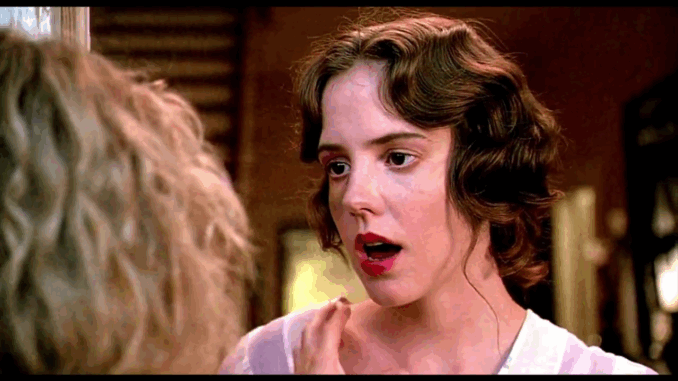
A Woman Shaped by Duty and Devotion
Ruth Jamison’s life in Fried Green Tomatoes is one marked by quiet endurance and self-sacrifice. Born into a deeply religious Southern family in the early 20th century, Ruth was raised to be obedient, kind, and selfless — a woman of virtue in a world that often misunderstood her inner fire. Her early life is not shown in full detail in the film, but the traces of her upbringing can be seen in the way she carries herself: gentle, reserved, and full of grace.
Unlike Idgie Threadgoode, who bursts with defiance and independence, Ruth follows the path expected of her, marrying Frank Bennett — a man who would become a source of trauma, control, and violence. Ruth’s choice was not necessarily driven by love, but by societal expectation and perhaps the illusion of security. In that way, she represents countless women of her era, confined by cultural scripts written long before they had a say.
Trapped in a Dangerous Marriage
Ruth’s marriage to Frank is one of the darkest elements of her life. Behind closed doors, Frank is physically and emotionally abusive. The film does not graphically depict the violence, but through Ruth’s eyes and Idgie’s concern, the truth is undeniable. Ruth’s suffering is profound, made even more painful by the presence of her child, Buddy Jr. Her fear isn’t just for herself — it’s for the baby she carries and the silent damage such an environment could cause him.
The decision to leave Frank is a turning point in Ruth’s story. It is not just an act of survival; it is a declaration of self-worth. With the help of Idgie, she escapes his control, and in doing so, begins to reclaim her identity. It is one of the most powerful moments in Fried Green Tomatoes, not for its action, but for its quiet rebellion.
A Love That Dared Not Speak Its Name

While the film never explicitly labels their relationship, the bond between Ruth and Idgie is deeply intimate, rooted in something far beyond friendship. In Ruth’s gentle presence, Idgie finds calm and purpose. In Idgie’s wild spirit, Ruth finds freedom and joy. Their connection, subtle yet unmistakable, forms the emotional heart of the film.
Their love is most vividly felt in the small moments: shared glances, laughter in the Whistle Stop Café, and unwavering loyalty through hardship. Ruth’s letters to Idgie, especially her final one, are filled with tenderness and gratitude. She calls Idgie her “best friend,” but the subtext speaks volumes. In a time when queer love could not be openly named, Ruth’s devotion becomes a radical act of truth.
Building a Life at Whistle Stop Café
Together, Ruth and Idgie run the Whistle Stop Café — a haven of food, community, and quiet resistance. Ruth is the soul of the café. She welcomes customers, shows kindness to everyone regardless of race or class, and helps create a space where people can feel at home. It’s no coincidence that the café becomes a sanctuary not only for them but for everyone in town, especially during the hardships of the Great Depression and the rising tensions of the Jim Crow South.
Ruth’s strength lies not in outbursts or declarations, but in the steady warmth of her presence. She nurtures Buddy Jr., embraces Sipsey and Big George as family, and chooses compassion over judgment at every turn. She is, in many ways, the moral compass of Whistle Stop.
A Graceful Goodbye
Tragically, Ruth’s life is cut short by cancer. Her final scenes in the film are a study in dignity, courage, and quiet heartbreak. Surrounded by her chosen family, she faces death with acceptance, even peace. It is not just her death that moves the viewer, but the way she lives up until the very end — lovingly, selflessly, and with strength that speaks louder than words.
When Ruth tells Idgie that she will “always be there,” it is not just comfort — it is truth. Her presence lingers in every frame that follows, especially in the café, where the warmth she cultivated endures. Ruth’s death is not the end of her story, but a transformation. She becomes memory, legacy, and spirit.
The Legacy of Ruth Jamison
In the context of Fried Green Tomatoes, Ruth Jamison represents the quiet, often invisible strength of women who endure, survive, and love deeply. She is not a loud revolutionary, but a soft one — someone who changes the world around her through grace and unwavering kindness.
Mary-Louise Parker’s portrayal adds layers of vulnerability and sincerity to the character, turning Ruth into more than just a supporting figure. She is the heart of the film — and arguably, the soul of Idgie’s transformation. Without Ruth, there is no café, no sanctuary, and perhaps no story at all.
Ruth Jamison may not be the most outspoken character in Fried Green Tomatoes, but her journey is among the most profound. Through abuse, escape, love, and loss, she embodies the resilience of women who choose love over fear, and family over convention. Her story reminds us that courage can be quiet, strength can be soft, and love — no matter how hidden — can change everything.
